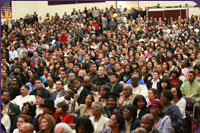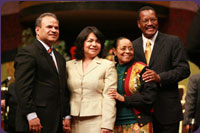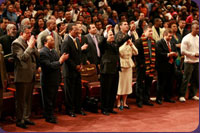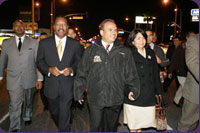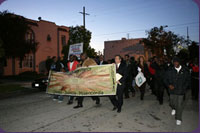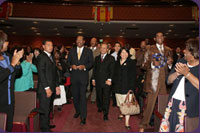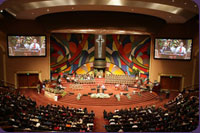y Su verdad y para esparcir el evangelio
and His truth and to spread the gospel
united in worship, working hand-in-hand to share God’s love
and a message of hope to the broken-hearted.
Noticias/News
Pentecost Sunday / Domingo de Pentecostés 2019
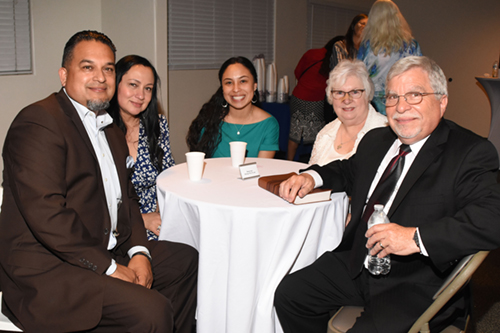
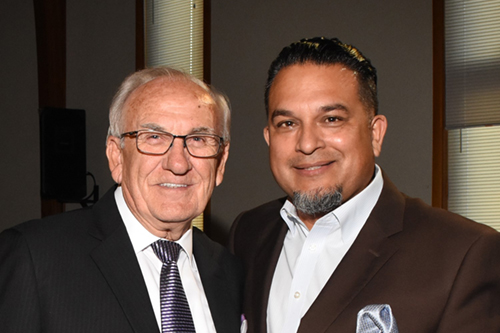
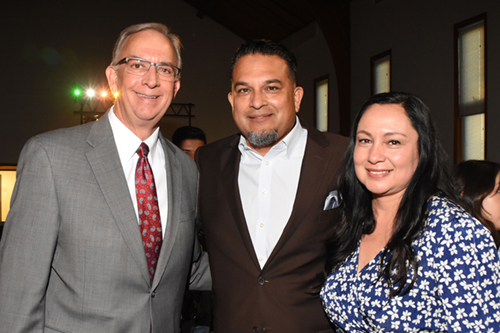
Healing Justice
Advocacy Project at Sylmar Detention Center
South Los Angeles Latinos and blacks find unity in worship
Members of predominantly African American and Latino churches along Crenshaw Boulevard hold joint services in an effort to overcome differences.
By Teresa Watanabe, Los Angeles Times
May 1, 2010
One is a Pentecostal, mostly African American congregation of 22,000, led by a world-renowned bishop with global ministries that extend to Africa and Haiti.
The other is one of the largest Latino evangelical churches in the city, whose Spanish-language ministries serve more than 4,000 members, most of them Salvadoran and Mexican immigrants and their children.
Located just four blocks apart along Crenshaw Boulevard in South Los Angeles, the two mega-churches — West Angeles Church of God in Christ and Iglesias de Restauracion — had never broken bread together, as cultural and linguistic differences kept them apart.
But that all changed Thursday night, when more than 1,500 believers from both churches worshiped together in what organizers billed as a historic attempt to overcome black-brown differences through shared faith and a sacred covenant to jointly address the violence, poverty and health problems that afflict both communities.
"This is the beginning of something great!" West Angeles Bishop Charles E. Blake roared as the crowd whooped and clapped and one person blew a shofar in evening services at his cathedral. "Our languages are different, but our hearts are the same!"
The Rev. Rene Molina, whose Restauracion is affiliated with El Salvador's largest church of 150,000 followers known as Mission Elim International, spoke in fiery Spanish as his son translated, telling congregants that their shared love for one God trumped all divisions.
The exhilaration was evident in the pews as well. Marlene Morales, a Mexican American teenager, said she was moved by the cross-cultural unity she had never experienced at Carson High School, where she said black-brown segregation, racial slurs and fights are common.
And Pat Campbell, an African American airport security worker who said many of her black friends had left the neighborhood because of the growing Latino presence, said the evening seemed like an answered prayer.
"I've been praying for this for a long time," she said. "I want to get along, work together and break down divisions."
The unity event, held on the anniversary of the 1992 Los Angeles riots, capped two years of what began as careful, tentative outreach between eight black and Latino pastors first brought together by the Rev. Alexia Salvatierra of Clergy and Laity United for Economic Justice. Salvatierra had been working with an evangelical Christian network of 1,200 Latino congregations in Southern California seeking allies in the fight for immigration reform.
During the initial encounters, she said, there were blunt confessions of mistrust between the two sides. African American candor sometimes offended Latinos used to a more indirect communication style. And black traditions of living out Scripture through social action caused unease among some Latino pastors who were taught to keep the spiritual and secular worlds separate, Salvatierra said.
The differences between leaders reflected tensions between their respective communities. Campbell, for example, said many of her African American neighbors grumble about perceived job competition from Latinos and ubiquitous Spanish speaking. And both sides lament the black-brown violence.
In the last six weeks, for instance, police say at least three shootings have occurred between black and Latino gangs in the Crenshaw/West Adams area. One of them resulted in the killing of a Latino passerby.
But Salvatierra said the guiding light that has bonded the pastors' group — which has blossomed into more than 120 members— is Jesus' words in John 17:23:
"May they be brought to complete unity to let the world know that you sent me and have loved them even as you have loved me."
In a news conference Thursday at Restauracion, pastors from both sides drew parallels in the pain their communities are suffering. The Rev. Norman Copeland, presiding elder for the African Methodist Episcopal Church, spoke of the mutual pain of family separation — for Latinos, through deportations; for blacks, through slavery in the past and incarceration today.
Others cited the lack of good jobs and quality supermarkets in the neighborhood, causing both communities economic distress and health problems, including obesity and diabetes.
Then both congregations filed into Restauracion's sanctuary, where Blake took the pulpit after lively music reflecting both cultural traditions. Hundreds then streamed down Victoria Avenue and Crenshaw Boulevard in a procession, hailed by honking cars, to West Angeles. There, Molina preached as the night came to a euphoric climax.
The next steps have not yet been charted out, but everyone seemed to have ideas for action. Morales and Campbell both cited the need to bring Latino and African American youth together through sports or other activities.
Salvatierra threw out the idea of prayer networks to focus on each other's biggest concerns: blacks praying for Latino families facing deportation; Latinos praying for jobs and stability for African Americans released from prison. Some pastors are proposing a more extended retreat for the two congregations to continue building spiritual bonds.
On Thursday, it seemed momentous enough that the two neighbors had at long last come together.
"Most important is to let people know it doesn't matter what color you are or language you speak, we can be together," said Nelson Umana, an El Savador native who works at a Burbank golf course. "We go to the same God."
teresa.watanabe@latimes.com
Copyright © 2010, The Los Angeles Times
http://www.latimes.com/news/local/la-me-0501-unity-20100501,0,7056938.story

